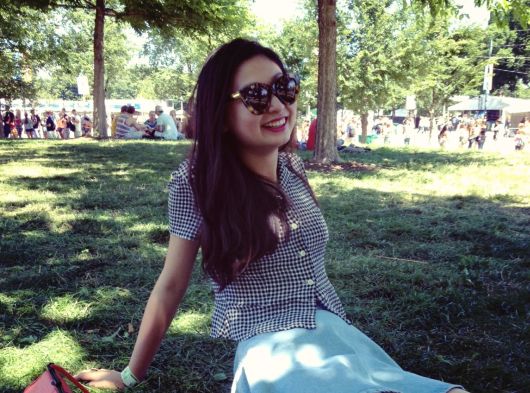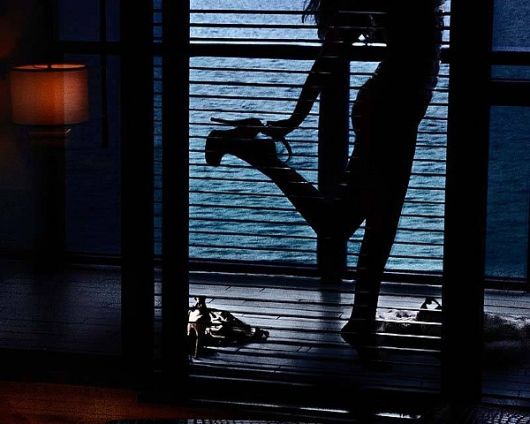 CHICAGO
CHICAGO In Which We Can Feel It All Over And Through Us
 Friday, January 17, 2014 at 10:36AM
Friday, January 17, 2014 at 10:36AM 
Places of Escape
by BRITT JULIOUS
“I’m a little tired,” I said to Sonia when we met for the first time at a cafe in Lincoln Park. “I stayed out late.”
“How late is late?” she asked.
“4 a.m.”
But really, 4 a.m. is only the beginning. I have danced until sunrise. I have waited and wandered home during the morning rush, a cup of caffeine in hand, walking against the tide of bodies going to while I'm coming from.
This is not a point of pride or contention, but I can recognize it now. Three years ago, I could not feel even black inside. There is a blankness to a state of depression that can only be understood after the fact. Black is absence of light. Blank is absence of order. But my closet was filled with delicate, sequined tops in blues and reds and greens, a balm for something it would take me years to fully articulate.
The night before, Crystal asked if I was attending a performance at SpyBar by George Fitzgerald, a young house musician and DJ. I wasn’t, but all of the lights were on in my home and all I could see was what I saw the night before.
It is so easy to wallow in your own problems. We often forget other people struggle too. I had forgotten until the night before. How many others do we forget until it is too late, until they are gone?
“In a cab,” I typed while still clothed in a bra and pajama bottoms.
The greatest thing I have learned in the past two years is how to escape myself. I envy those people who can stay inside, comforted with their things and self. I will forever be a work in progress. In the future, I hope I can stay home and have that be enough, but right now, my walls close in on me. At first, they are protective, but quickly, they keep me trapped in thoughts born out of 26 years of insecurity.
Not all places of escape are the same for all people. We each develop something that speaks to our everyday, our tastes, our sorrow. I know mine more than many other things in my life: the dance floor; the blinding, shimmery lights; the weight of the bass.

One of the first things Marion ever said to me was that negativity breeds negativity. Positivity does not act the same. No, positivity takes constant effort. Happiness is effort. Joy is work. People who tell you differently are dangerous and lying to you to mask the things they’d rather not be.
I understand that. It is the illusion of attraction and beauty, things that feel less natural, more the work of the self and how it wants to move through the world.
I think that negative memories work in much the same way. Unless the night was truly spectacular, we rarely remember solid pleasantness. Moments that are just good fade until weeks and months bleed into one another. But the bad has a way of staying, an unwanted acquaintance that takes root on the couch of your mind and forever overstays.
The bad can direct the ways in which you move around in the world. I am learning to unravel the negativity in my soul that has shaped me precisely like millions of other young women in the world. Imagine thinking that unpleasantness is born within you. Thinking that your mind and body are made to be used and discarded and your future is to forever watch other people simply breathe and live. This is what I am trying to escape once and for all.
We ignore our need for places of escape because if one does not work as it is intended to, then what value could we possibly find in the search? The dance floor is nothing new to me, but I opened myself up to it, all of it, as if discovering dark walls of sound and the pleasures of anonymity for the first time.
I see these sidewalks and storefronts everyday. Keep your head down to tolerate the cold. Keep your head down to not seem too proud, too confident, too sure of yourself. Get into the building and sit down and stay there in front of your screen and your work and your things to do.

We are told to believe in the grind and when we finally wake up from that fever dream of things to do, we realize it is too late. All around you is a world that has moved on.
The escape then is the bridge between the grind. It is the pulse. It keeps you moving. I used to think that I could only find it in another person. But the only person you can ever truly know is yourself. Know yourself and your needs and everything falls into grace.
That is the thing about beginning to know yourself. You can see things as they are and stay the same, or you can see them and try to change. Change is rawness, is destruction of the familiar and the usual. And even if you are forever in pain, it is easier to know pain or anger than it is to try for something better. Eventually, you must confront the things that have caused this state of permanence. Most people hide from the truth. I have and will forever refuse to be most people.
George’s set started late and the more I waited, the more frustrated I felt. Is the dance floor the drug or the cure? Is it pure of intentions or masking reality?
If you repeat something enough times, it can grow from what you need to do to what you want to do. That is what the dance floor became for me, a place that I actually liked and understood more than my own home or the job I fear I will never escape.
But I reverted back to its core purpose this time and waiting became a test of the self.
“Is that George?” I asked myself, even though I knew it wasn’t true.
Eventually he took to the booth and what I thought would take hours to feel pleasurable took only moments. “Magnetic,” a song that sounded just OK months earlier thumped through the speakers, the bass a complete jolt to the system. I could feel it all over and through me. To know this feeling is to know it can never truly be articulated. But also, to know it is to love it so fiercely.
“I don’t know how you can go out all the time,” a man I cared for said to me once.
But I don’t go out all the time, I thought. I go out enough. I go out when I need to. I go out sometimes and then I come home and then I keep going about my life.
I left barely an hour into his set. That was all I needed.
Outside, cabs still roamed the neighborhood as if dawn was not quickly approaching. I got a friendly cab driver, something I find happens late at night. There are stories to share and time to listen. This works both ways with both passengers.
“You had a good night?” he asked.
“Yes!” I said still brimming with enough energy to last me through the rest of the weekend.
“Yeah, yeah. I can tell,” he said. We locked eyes in the mirror and sped down the expressway.

Chicago has something special in its electronic scene, a specialness that is recognized on its surface and for its history, but not for how it connects people, how it keeps something surprisingly warm alive for music felt to be so cold.
I remember standing on the corner of Chicago and Halsted after coming from a party in the River West neighborhood of the city. It was that biting cold you’ll only ever understand if you live here. It was that cold that makes people move away from here, makes people give up on the city, makes people see the city for what it is and believe that it will never get better.
But the party ran very late and like many times before, I was one of the stragglers refusing to go out from what felt warm and good and pure because of the music. Lots of deep house and UKG. Lots of music that feels instantly familiar. Lots of music that sounds from the future and forever.
The wind whipped against my face and I opened my mouth to breathe in deeply the air that finally felt clear. I saw a young man I met earlier in the night, but had forgotten quickly. He found a cab before I did.
“Here, you take it,” he shouted.
“No, it’s fine. I’m going South,” I said.
“Really? You sure you’re okay getting back?” he said.
I just nodded my head.
Britt Julious is the senior editor of This Recording. She is a writer living in Chicago. She last wrote in these pages about Orange is the New Black. She tumbls here and twitters here.
Photographs by Isabel Muñoz.

"Magnetic" - George Fitzgerald (mp3)
"Bad Aura" - George Fitzgerald (mp3)
"Daily Spirals" - The Cyclist (mp3)
"All I Need" - Daniel Avery (mp3)
"Drone Logic" - Daniel Avery (mp3)

 brittany julious,
brittany julious,  chicago
chicago 




































